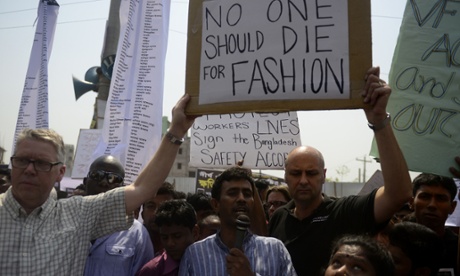
After more than two years of negotiations involving backroom deals, activists chaining themselves to shops, global petitions and statements by G7 leaders, the Rana Plaza donors trust fund has finally met its target of $30m.
When the Rana Plaza factory complex in Dhaka, Bangladesh, collapsed in April 2013, a campaign was launched to provide adequate compensation to the families of the 1,134 people killed in the collapse and the 2,500 severely injured survivors.
The campaign focused on securing compensation not just from brands that had been producing at Rana Plaza, such as Primark, but from any brand using Bangladesh to manufacture clothing.
Ben Vanpeperstraete, from the global trade union UNI and trade union federation IndustriALL, who worked on the organising committee for the fund, describes the “unprecedented” step of bringing together all the stakeholders to discuss compensation. This was to avoid brands acting unilaterally and “coming up with their own calculations which risks that at the end there is not enough money in the bank account”.
Rather than a voluntary agreement, a structure was negotiated based on existing International Labour Organization (ILO) compensation conventions. Vanpeperstraete describes this as a “technical, yet political” feat.
Once an agreement was reached, payments to the fund began to arrive. British retailer N Brown Group Plc (owner of brands including SimplyBe, JD Williams and Nightingales) made a “humanitarian donation” to the fund as it manufactures in Bangladesh, although not at Rana Plaza.
At the same time as the framework was being agreed, injured and bereaved compensation claimants were being registered in Dhaka. Sam Maher, from Labour Behind the Label, worked on efforts to distribute the fund in Dhaka, a process she describes as hugely complicated, to the point of new actuarial software needing to be written for the purpose. Payments were calculated on the number of dependents each claimant had and their salary updated to the new minimum wage.
“The biggest issue is that everyone’s wages were so damn low to start with,” Maher says. “It’s not compensation in the true sense; it’s purely to replace income that was lost.”
The formula for payments was published on the fund’s webpage and workers received an explanation of their payment, with 90 days to query their award.
“The whole process is overseen by a multi-stakeholder committee,” Maher says. “It’s not brand controlled, it’s not controlled by us or by the unions, and it’s overseen by a team of lawyers. Then at the top there are two Bangladeshi and one international commissioner who are completely independent from the industry.”
Slow response from brands
But trouble occurred as key brands held off from making payments. “It was at this time that the lack of funding became a funding crisis,” Vanpeperstraete says. Some brands donated dramatically less than their calculated total. For example, Walmart, the world’s largest retailer with net sales of $482.2bn donated an estimated $1m.
A global campaign began to pressure brands to donate. One million signatures were gathered on an Avaaz petition asking Benetton to pay its share. The company, which was producing at Rana Plaza and has an annual turnover of $1.6bn, donated just $1.1m in April 2015.
Another key campaign moment was the “PR disaster” arrest in the US of two Bangladeshi activists outside the retailer Children’s Place in March 2015. Mahinur Begum, an 18-year-old survivor of the factory collapse, had travelled to New Jersey from Dhaka to deliver a letter to the company’s chief executive when she was arrested for trespass.
The other arrest was of Kalpona Akter, executive director of the Bangladesh Center for Worker Solidarity (BCWS). She describes the reaction in Dhaka to the fund’s success as relief mixed with sadness at the two-year delay.
“We believe it could have been sorted out by these companies in a few minutes with a few phone calls,” she says. “They have money, but they don’t want to take responsibility. Ultimately they are the responsible people, who made these children orphans and put these families in a very bad shape emotionally and financially.”
“In comparison to the loss of families and victims, compensation doesn’t really alter anything,” Akter says. “But it will still help at least to send these kids to school and to put food on the table for these families. I want to thank every single person who was involved in this campaign, everyone who sent even one sentence to a brand and asked for compensation for these families.”
G7 leaders intervene
At the second anniversary of Rana Plaza there were more protests, but the fund was still $2.4m short. The final donation, given anonymously, coincided with this week’s G7 Summit meeting in Bavaria, Germany. A spokesperson for the German government, Dr Anja Trebes, said her government and its G7 partners “called upon the business community to close the funding gap as soon as possible against the backdrop that responsible supply chains are one of the issues highlighted by the German presidency of the G7”.
The G7 has committed to establishing a “Vision Zero Fund”, an insurance trust to be established in cooperation with the ILO. As well as being a compensation fund, this project aims to prevent future disasters. Dr Trebes describes potential beneficiaries of the fund as “workers and management, social partners, NGOs, supplier companies, national and local administration, and – where suitable – private initiatives in producing countries”.
“The most important thing is that we did manage it – the workers of Bhopal are still waiting for their money 30 years later,” says Vanpeperstraete. “Next time, let’s make sure we get the money faster so that we don’t have years of painful campaigning in order to get $30m, which is peanuts in comparison to the profits of this sector.”

